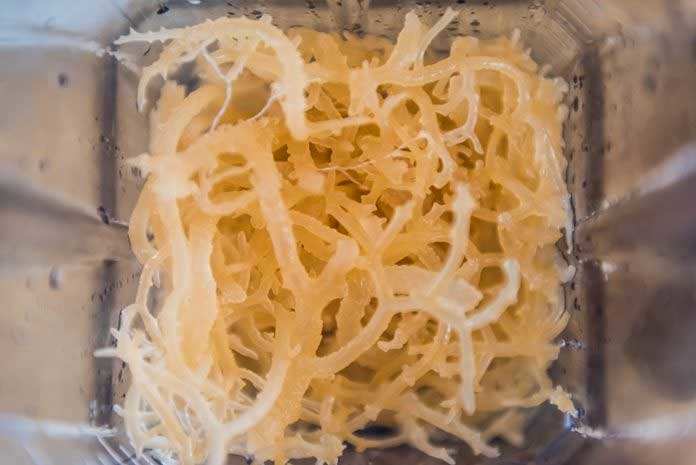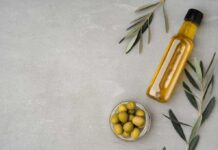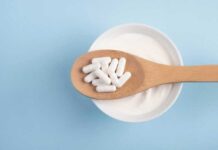
Whether dried or raw, this red algae is packed with iron, iodine, and magnesium. Learn about sea moss nutrition, benefits, and risks. Plus, find out how to eat it.
The Rise Of Sea Moss
If you’re curious about the recent internet craze over sea moss, you’re not alone.
Pinterest’s 2020 Trends Report reveals that search volume for the term “sea moss” jumped 380 percent last year, possibly thanks to a comment Kim Kardashian’s made about sea moss smoothies on Twitter.
Marine ingredients and supplements have become so popular that the 2018 market reflected $2.6 billion spent on algae products alone, according to Statista, a market research company.
“People are always looking for the next superfood,” says Amy Gorin, a plant-based registered dietitian nutritionist and owner of Plant-Based Eats in Stamford, Connecticut. First there was the algae product spirulina, and now there’s sea moss.
Gorin says sea moss has probably risen in popularity because it provides several nutrients “that are notable to plant-based eaters,” a growing population.
Low in calories and packed with micronutrients, sea moss could be a healthy addition to your favorite smoothie, soup, or even chia seed pudding.
Here’s everything you need to know about sea moss, including its nutrition, health benefits, and how to add it to your diet.
What Is Sea Moss?
Sea moss, also known as Irish moss, is a type of red algae.
When it washes up on the northern Atlantic coasts of Europe, North America, and some Caribbean islands, it looks similar to the frequently spotted tangles of slick brown seaweed known as sargassum, according to a 2014 study in Advances in Botanical Research.
You can find this flavorless, edible sea plant in supplements, in raw, dried, or gel forms, according to Vicki Shanta Retelny, RDN, an author and host of the “Nourishing Notes” podcast.
Sea Moss Nutrition
Sea moss is a natural source of micronutrients such as iodine (essential for thyroid function) and iron (an essential mineral for physical and mental energy).
A standard two-tablespoon serving of raw Irish sea moss contains the following nutrients:
Calories: 5
Fat: 0 g (0 percent recommended daily value, or DV)
Protein: 0.2 g (0 percent DV)
Sodium: 6.7 mg (0 percent DV)
Carbohydrates: 1.2 g (0 percent DV)
Dietary fiber: 0.1 g (0 percent DV)
Magnesium: 14.4 mg (4 percent DV)
Calcium: 7.2 mg (1 percent DV)
Potassium: 6.3 mg (0 percent DV)
Iron: 0.89 mg (5 percent DV)
Phosphorus: 15.7 mg (2 percent DV)
Types Of Sea Moss
Though most sea moss products are made from the red algae Chondrus crispus, the term “sea moss” may sometimes refer to algae or seaweed that comes in various colors, from green and yellow to purple and black.
Shanta Retelny says the plant’s nutritional profile can vary depending on where it is grown.
Some sea moss product manufacturers claim that ocean-harvested sea moss is better than sea moss grown in a controlled environment, such as a pool.
However, there’s little research on the nutritional differences, and existing studies do not back up the claim.
Sea Moss Benefits
“Sea moss may have potential benefits for gut health, blood sugar control, and cell and heart health, but more robust research is needed, especially in humans, to determine the benefits of sea moss,” says Shanta Retelny.
Despite the lack of studies, there’s a simple reason sea moss has taken the wellness world by storm: it has a strong nutritional profile.
Iron
Gorin notes that 100 grams of sea moss (about 20 tablespoons) provides 50 percent of your recommended daily value of iron.
“Iron is a nutrient that vegetarians and vegans need to pay particular attention to, as needs are actually higher than those of meat-eaters because the absorption of iron from plant-based foods tends to be lower,” she says. That’s because a lot of high-iron foods are animal products—think red meat, oysters, and chicken.
Too little iron can lead to anemia, but plant sources of iron, like sea moss, can help you maintain your levels.
Magnesium
According to Gorin, that same 100-gram serving of sea moss contains about 34 percent of your recommended daily value of magnesium.
The mineral is often underrated, but it’s essential for dozens and dozens of your body’s processes.
Gorin lists several benefits of magnesium: bone health, blood pressure management, and proper sleep.
A magnesium deficiency can manifest as constipation, shakiness, chronic fatigue, poor sleep, and even frequent headaches. Regular consumption of sea moss could help keep your magnesium levels in the safe zone.
Iodine
Your thyroid needs iodine to make hormones, and since the body doesn’t make iodine, you need to get it from your diet.
“Like other seafood, [sea moss is] high in iodine,” says Shanta Retelny.
If you don’t get enough iodine, your body can’t make thyroid hormone, and you could end up with a thyroid problem.
Keep in mind that iodine is often added to salt (known as iodized salt), so iodine deficiencies—which can cause a swelling of the throat known as goiter—are much less common than in the past.
And too much iodine can be bad for your health. (Read on to find out more about the risks of consuming too much sea moss.)
It Might Protect Your Nerves
A 2015 study published in the journal Marine Drugs suggested that red algae could have neuroprotective effects. The preliminary research demonstrated that worms given sea moss extract had lower neuron loss and moved faster. That could potentially help people with Parkinson’s disease.
But not so fast. Before you lay down cash for some sea moss, remember the study was conducted on worms. That’s good for very preliminary research, but only human studies can tell whether the algae would have the same effect in humans.
So while sea moss might help protect against neurological disease, research is too limited to say for sure. Controlled studies on humans are necessary to confirm the suspicion.
It May Help Weight Loss
Some sea moss fans claim that it accelerates weight loss, but Gorin warns against believing in “one magical food” to reset your diet.
“One cool thing about sea moss is that it provides protein, almost two grams per 100-gram serving,” she says. It is also low in calories, which could aid weight loss.
And, Shanta Retelny says, “it’s a natural form of carrageenan, a thickening agent.” This could function as a soluble fiber that boosts feelings of fullness, according to a 2020 research review published in the science journal Life.
A 2019 study published in Marine Drugs also suggests that the carrageenan in sea moss could act as a prebiotic, feeding the good bacteria in your gut. A proper balance of prebiotics and probiotics is essential for digestive health, which could support your weight loss efforts.
Risks And Side Effects
As mentioned, sea moss contains iodine, which plays a vital role in thyroid function. But Shanta Retelny warns that overconsumption of iodine can cause thyroid problems. Similar to iodine deficiency, too much iodine can cause goiters and hypothyroidism.
The recommended dietary allowance for iodine is 150 micrograms (mcg) for most adults.
According to the National Institutes of Health, the maximum tolerable intake level of iodine for most adults is 1,100 mcg. Eating more than 286 grams of sea moss in one day could lead to health problems because it would exceed that limit, according to a 2020 study published in Environmental Science and Pollution Research.
Aside from potential iodine overdose, which can cause mouth burning, stomach pain, and a weak pulse, sea moss “may contain a high amount of heavy metals,” says Shanta Retelny. “As with anything, moderation is key.”
How To Shop For Sea Moss
Sea moss supplements are often combined with doses of anti-inflammatory turmeric or other health-boosting nutrients.
For pure sea moss, look for dried or fresh red algae labeled “Irish moss” or “Chondrus crispus.” You can find it online or at some health food or supplement stores.
The U.S. Department of Agriculture does not recommend a specific serving size for sea moss, so follow the serving sizes listing on your product label for the best results.
Want to give sea moss a try? Here’s what our nutrition experts recommend.
How To Eat Sea Moss
Adding sea moss to your diet is simple. If you buy it raw instead of dried, Gorin says you’ll need to wash, soak, and blend it before consuming.
Here are a few ideas:
- Blend a couple of tablespoons of sea moss into your favorite morning smoothie.
- Use sea moss to thicken broths and soups.
- Add sea moss gel to homemade ice cream as a binder.
- Stir a spoonful of sea moss into applesauce or pudding.
Many sea moss recipes call for sea moss gel, which is simply dried sea moss soaked in filtered water overnight.
There is no research on how long sea moss gel will stay fresh in your refrigerator, so store leftovers at your own risk.
Sources:
- Advances in Botanical Research: “Chapter Three – Chondrus crispus– A Present and Historical Model Organism for Red Seaweeds”
- Amy Gorin, MS, RDN, a plant-based registered dietitian and owner of Plant-Based Eatsin Stamford, Connecticut
- Encyclopædia Britannica: “Irish Moss”
- Environmental Science and Pollution Research: “Risk assessment of iodine intake from the consumption of red seaweeds (Palmaria palmataand Chondrus crispus)”
- Journal of Phycology: “Comparative genomic analyses of transport proteins encoded within the red algae Chondrus crispus, Galdieria sulphuraria, and Cyanidioschyzon merolae 11”
- Life: “A Comprehensive Review of the Nutraceutical and Therapeutic Applications of Red Seaweeds (Rhodophyta)”
- Marine Drugs: “Prebiotics from Seaweeds: An Ocean of Opportunity?”
- Marine Drugs: “Neuroprotective Effects of the Cultivated Chondrus crispusin a elegans Model of Parkinson’s Disease”
- National Institutes of Health: “Magnesium”
- NIH: “Iodine”
- NIH: “Iron”
- Pinterest: “Pinterest 100: Trending on Pinterest”
- Statista: “Market value of algae products worldwide from 2018 to 2025”
- USDA FoodData Central: “Seaweed, irishmoss, raw”
- Vicki Shanta Retelny, RDN, LDN, author and host of the “Nourishing Notes” podcast
- Twitter: @KimKardashian, February 4, 2020
- National Institutes of Health: Iodine
Important Notice: This article was originally published at www.thehealthy.com by Leandra Beabout where all credits are due.
Disclaimer
The watching, interacting, and participation of any kind with anything on this page does not constitute or initiate a doctor-patient relationship with Dr. Farrah™. None of the statements here have been evaluated by the Food and Drug Administration (FDA). The products of Dr. Farrah™ are not intended to diagnose, treat, cure, or prevent any disease. The information being provided should only be considered for education and entertainment purposes only. If you feel that anything you see or hear may be of value to you on this page or on any other medium of any kind associated with, showing, or quoting anything relating to Dr. Farrah™ in any way at any time, you are encouraged to and agree to consult with a licensed healthcare professional in your area to discuss it. If you feel that you’re having a healthcare emergency, seek medical attention immediately. The views expressed here are simply either the views and opinions of Dr. Farrah™ or others appearing and are protected under the first amendment.
Dr. Farrah™ is a highly experienced Licensed Medical Doctor certified in evidence-based clinical nutrition, not some enthusiast, formulator, or medium promoting the wild and unrestrained use of nutrition products for health issues without clinical experience and scientific evidence of therapeutic benefit. Dr. Farrah™ has personally and keenly studied everything she recommends, and more importantly, she’s closely observed the reactions and results in a clinical setting countless times over the course of her career involving the treatment of over 150,000 patients.
Dr. Farrah™ promotes evidence-based natural approaches to health, which means integrating her individual scientific and clinical expertise with the best available external clinical evidence from systematic research. By individual clinical expertise, I refer to the proficiency and judgment that individual clinicians acquire through clinical experience and clinical practice.
Dr. Farrah™ does not make any representation or warranties with respect to the accuracy, applicability, fitness, or completeness of any multimedia content provided. Dr. Farrah™ does not warrant the performance, effectiveness, or applicability of any sites listed, linked, or referenced to, in, or by any multimedia content.
To be clear, the multimedia content is not intended to be a substitute for professional medical advice, diagnosis, or treatment. Always seek the advice of your physician or other qualified health providers with any questions you may have regarding a medical condition. Never disregard professional medical advice or delay in seeking it because of something you have read or seen in any website, video, image, or media of any kind. Dr. Farrah™ hereby disclaims any and all liability to any party for any direct, indirect, implied, punitive, special, incidental, or other consequential damages arising directly or indirectly from any use of the content, which is provided as is, and without warranties.








